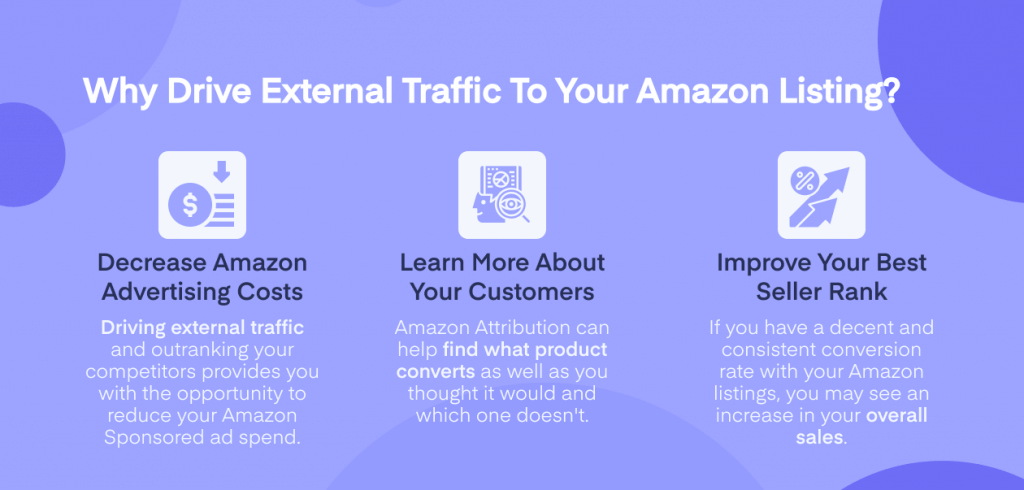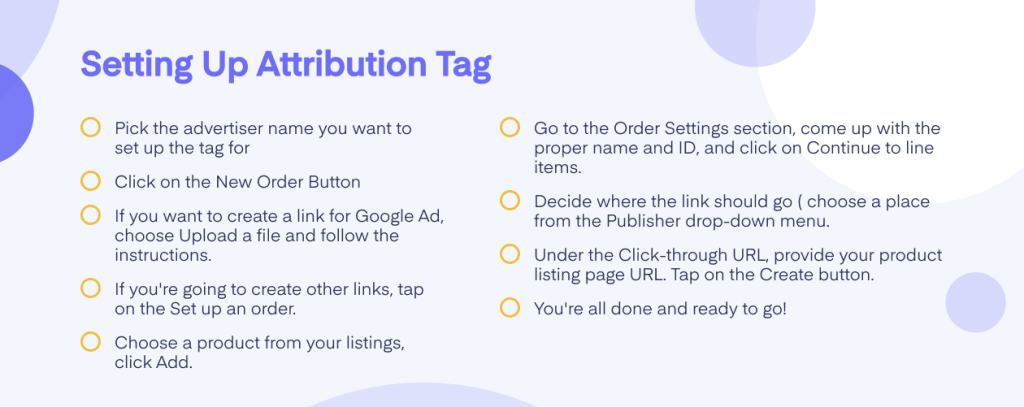A guest post from our friends at Profit Whales, who help brands use marketing budgets and increase conversion rates efficiently.
Amazon sellers know firsthand how difficult it is to track and measure the impact that external advertising channels have on sales. What kind of content and which channel helps bring the most audience to your Amazon page is a tricky question to answer; once users land on your store, it’s anyone’s guess where they came from.
One of the very few and long-overdue tools that can help trace consumers and measure off-channel ad campaigns efficiency is Amazon Attribution.
What is Amazon Attribution?
Due to the wide range of marketing tasks, it can be challenging for a seller to get a more holistic view of omnichannel marketing efforts and a better view of a customer journey. Amazon Attribution was explicitly created to track the performance of external ads.
Amazon Attribution is a new tool that promises to boost your business, including your sales, traffic, and conversion rates, by improving experiences off-Amazon. This tool provides an insight into how non-Amazon marketing strategies affect sales on Amazon. It helps track external traffic that eventually converts sales or traffic on Amazon.
But why is this external traffic so important, and why should you spend the time and effort driving external leads for conversions on Amazon? Let’s clarify the situation.
Why Drive Traffic to Amazon?
The competition on Amazon is fierce, and the ad costs are rising promptly. So it is vital for businesses to find creative ways to use their advertising budgets or perhaps even reduce them. While Amazon offers its sellers and brands a range of compelling internal advertising solutions to help expand the reach of their advertising, it is still vital that brands find external advertising solutions.
External traffic yields the biggest overall ranking and keyword ranking impact on Amazon. That’s why Amazon favors those external listings that convert well on the marketplace. It even launched its Brand Referral Bonus program offering up to 10% cashback from sales that happen as a result of non-Amazon marketing efforts.

Why is Amazon Attribution So Vital?
Some sellers find it increasingly difficult to achieve visibility and sales on Amazon because it is the world’s largest shopping site. Amazon provides advertising options, such as Sponsored Products, Sponsored Brands, and Sponsored Display, which tend to be an excellent way to get people to take notice of your product. The sheer number of Amazon sellers has a significant impact on the final price of advertising services. Some brands find it difficult to afford these Amazon ads.
Other options for such brands include advertising through Google Ads, Facebook Ads, or any other external channel that fits their needs and boosts external traffic. Besides, Amazon loves listings that drive external, so as long as your external traffic eventually converts on Amazon, your organic keyword ranking will improve as well.
However, it was not possible to measure external traffic to your Amazon listing or locate its sources for quite a long time. And while most companies used (and still do) multi-channel advertising, it couldn’t be used to its fullest without the tools to track users’ interaction with products and measure the conversion rates from the off-Amazon channels. Indeed, if you can not identify which channel is primarily responsible for your business growth, you won’t be able to improve your marketing strategy.
But it happened: Amazon released the long-anticipated tool that provides accurate conversion data allowing marketers to measure their marketing campaign performance. Businesses can now take advantage of the ability to optimize their sales funnel and ad campaign to develop an effective strategy that will boost their visibility and conversion rate.
Who Can Use Amazon Attribution and How Much Does it Cost?
Amazon Attribution has become a crucial source to set businesses’ action plans and goals. One of the benefits of using Amazon Attribution is that it is currently available for free. This is great news for e-commerce owners. Amazon Attribution can be accessed through the platform’s service console or tools integrated with the Amazon Advertising API. Amazon Attribution is still in its BETA stage and can only be used by Amazon Brand’s Registry sellers in North America and Europe.
How Amazon Attribution Works
Amazon Attribution can help you complete three main tasks:
- Measure: rather than letting the impact of your cross-channel digital marketing activities remain a mystery, make sure to understand how they affect conversions and revenue.
- Optimize: once you have measured your marketing channels, you can determine which ones are working well and which ones require creative change.
- Plan: plan future marketing campaigns following the key conversion metrics that Amazon Attribution provides (click-through rates, detailed page views, add to carts).
One of the responsibilities of retailers on Amazon is comparing the performance of different Amazon ad campaigns. If you are attempting to increase your brand or business awareness, you will want to pay close attention to impressions. This will allow you to assess the awareness your ad campaigns have generated.
If you’re willing to increase sales, you should analyze the conversion rate to check how much awareness obtained from impressions converts into sales. You will need to keep track of your average cost-per-click to assess your return on investment accurately. It is vital to remember that the CPC metrics differ across placements.
Amazon’s last-touch attribution model considers various factors, including how the customer interacted with the ad. Amazon has also introduced new-to-brand metrics, which are helpful for providing more specific attribution. It makes it possible to check if those are existing customers or new customers that make an ad-attributed buy. This way, you can estimate the cost of getting new Amazon customers and find out which acquisition channels are most cost-efficient.
Best Amazon Attribution Features
Besides simply tracking URLs, Amazon Attribution has numerous features that marketers can utilize.
Full-Funnel Advertising Analytics
Appropriately providing vital sales funnel data, such as from awareness to consideration to purchase, is a crucial capability of Amazon Attribution. Amazon charts the course of how consumers interact with your product on Facebook, Instagram, or any other channel you used to advertise it. You can get data on how often customers are clicking on the product, the number of visits to the detail page, how many times the product was added to the shopping cart.
On-Demand Amazon Conversion Metrics
You can review campaign performance in real-time. Real-time marketing reporting allows marketers to adapt their marketing campaigns efficiently and accurately, swifter than ever before.
Customer Insights
Amazon Sellers can explore a potentially new avenue for sales by discovering how their shoppers engage with their brand and getting fresh insight on what has to change in their ad strategy. In short, marketers are able to comprehend how the users who visit their online stores behave once they are there.
Different Tracking for Different Advertising Channels
Amazon Attribution enables marketers to create different tags to designate other marketing channels and create separate reports for each. You can create hundreds of tags to generate a detailed report on the performance of each channel.
The Benefits of Using Amazon Attribution
We’ve already talked about how Amazon Attribution tracks your ad performance, but you can get other benefits from this console as well.
Using this tool correctly, you can:
- Reach your target customers and increase your sales faster and quicker by reaching them on the most visited channels.
- In addition to shipping and customer service, add Amazon Prime to your mix, ensuring a winning combination for your business.
- Drive your customers to your optimized listing or detail page.
- Foster demand through social media channels.
- Keep your brand on customers’ minds by providing a diverse range of content material across your digital platforms.
- Deploy DSP retargeting to re-engage with your buyers and maintain a high degree of efficiency.
Getting Started with Amazon Attribution
We have already mentioned that Amazon Attribution is only available to brand-registered and professional third-party sellers. To get started, they need to fill out a sign-up form or register through Seller Central.
After setting up the Attribution account, it will be possible to add the products and campaigns they want to track.
Attribution Tag
The attribution tag works similarly to Facebook or Google tracking pixel: it allows for tracking visitors across your site. From the moment they click on your off-Amazon ad, the tag is “attached” to the customer’s entire product search journey, following them the whole way. The only thing you need to do is insert the tracking URL into your external marketing campaign, and it will track the user up to your Amazon listing. After you’ve signed up into Attribution, Amazon guides you step by step facilitating the attribution tag setup process.

Note: you can create dozens of Orders, but keep in mind you will have to generate a report and combine this info with the external data. It is a good idea to note the date when you add a click pixel to a piece of media to avoid having to add them all at once.
Takeaway Message
Amazon Attribution sheds light on the customer journey before they get to Amazon listings and provides insights into implementing omnichannel marketing efforts better.
There has never been a better time to learn about your customers’ browsing habits than now. Why wait? Set up your account and learn how to optimize your marketing campaigns outside the Amazon platform, drive more conversions, and monetize your efforts.
Good luck with your marketing endeavours!
Ihor Dubovetskyi is Co-founder and CEO at Profit Whales.
Book a demo to learn more about how eDesk can help your eCommerce business deliver an excellent customer experience every time. Ready to get started now? Try eDesk free for 14 days, no credit card needed.

